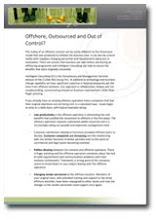The verdict appears to be in: 2015 is set to see a return of pre-recession ‘talent wars’ as we head into a so-called ‘candidate’s market’.
Attracting the right talent is increasingly becoming recognised as the most important aspect of ensuring competitiveness and nowhere is this more apparent or necessary than in organisations trading internationally.
This is combined with a trend we are seeing where business are now looking for new kinds of leaders and entrepreneurs that come with skills to thrive within the global knowledge economy.
There is no doubt about it that this mix is resulting in significant increases in both the supply and demand for skilled workers across the globe. In this environment, it is the role of governments and industry to think carefully about how they engage with the global talent pool and how they can select most effectively from it.
But can it be said that just by being in a prime location for attracting highly skilled migrant employees that we – or the countries we would recruit from – can achieve a long-term balance?
There are several areas that no doubt need attention, but with an election around the corner the recruitment industry must take steps now to ensure that whoever is next in Government is in pole position with relevant policy to help attract, select and retain skilled immigrants.
And of course, the role of employers in attracting and selecting immigrants is vital. Immigration policy in fact should never be a relationship simply between governments and individuals, but instead needs to be a three-way interaction where employers are involved from the very beginning.
After all, the State relies on its businesses and recruiters to create the opportunities that attract highly-skilled immigrants, as well as to identify which applicants have the most needed or relevant skills. Employers in return need policies that are both predictable and transparent so that they can do this work.
And what happens to the countries where talent is on the move?
The impact of this can most recently be seen in Greece, where it has been reported that more than 200,000 Greeks have left the country over the past five years, resulting in ‘part of the biggest brain drain in an advanced western economy in modern times’.
Doctors have reportedly moved to Germany with many Greek academics now living in the UK – in fact, according to Endeavour, the international nonprofit group that supports entrepreneurship: ‘Of the 2% of the population who have left, more than half have gone to Germany and the UK. Migration outflows have risen 300% on pre-crisis levels, as youth unemployment soars to more than 50%. Around 55% of those affected by record rates of unemployment are under 35.’
This is not unique and the mass migration of skilled and young workers from countries where there is not so much opportunity could have a serious impact on the wider global economy by taking too many people from one area to supply to Western demand.
All this means that governments and business alike needs to also consider this when shaping their own international recruitment policies.
The discussion is sure to continue but as the ‘war for talent’ looks set to intensify we must all ensure we are fully informed to make responsible, long-term decisions that suit the employment climates both home and away.







No comments:
Post a Comment